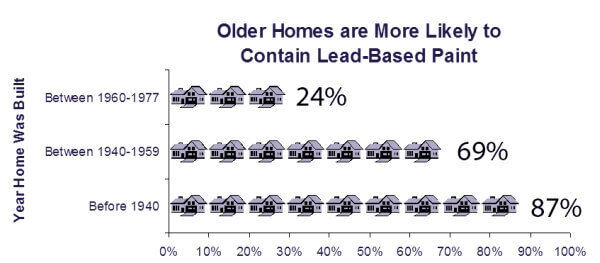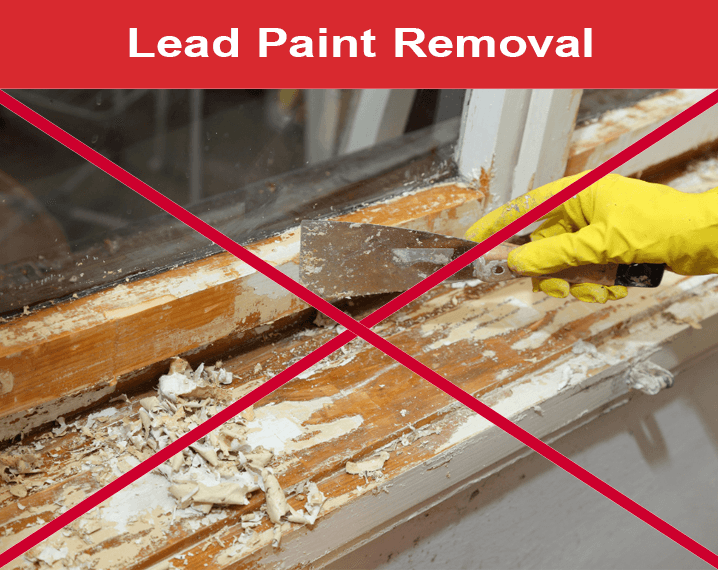Disclaimer: The information on this page is intended for general informational purposes only and is not to be used as a substitute for professional certified lead paint abatement and legal advice. Colony Property Investments is a local New Hampshire home buying company that can purchase your house with lead paint, without you having to do anything!
Does Your House Have Lead Paint?
Lead-based paint has historically been used since the late 1800s because of its durability. However, since the mid 1920s, the dangers of lead paint and specifically lead poisoning of children gradually led to the decline in the use of lead-based paint. Residential and consumer use of lead-based paint was banned by the Federal Government in 1978.

According to the New Hampshire Department of Health and Human Services, New Hampshire has the oldest housing of anywhere in the United States with 62% of its homes built before lead-based paint was banned in 1978.
What Are the Health Hazards of Lead Paint?
Lead paint is generally not a problem as long as its surface is in good condition. However, damaged, chipped, flaking, or peeling lead paint (including contaminated dust) is highly toxic especially to young children under age 6. Babies and toddlers are particularly vulnerable to lead poisoning because of their tendency to ingest peeling paint chips or teethe on window sills, railings or door frames. Homes with exterior lead paint can also result in contamination of nearby soil due to paint flaking or peeling. This also poses hazards to children putting their hands in their mouths when playing outside after touching contaminated soil or toys in the yard.
Exposure to lead is especially hazardous during early child development years because it is more easily absorbed into the body, and affects most internal vital body organs, brain, and especially nervous system.
According to the CDC, exposure to lead can seriously harm a child’s health and cause well-documented adverse effects such as:
![]() Damage to the brain and nervous system
Damage to the brain and nervous system![]() Slowed growth and development
Slowed growth and development![]() Learning and behavior problems
Learning and behavior problems![]() Hearing and speech problems
Hearing and speech problems

Should I Remove Lead Paint?
Regardless of whether you plan on renovating your house, selling your house, or continue living in your house, it’s critically important to understand your options about dealing with the dangers of lead paint exposure. You may choose to just put a fresh coat of paint over existing lead paint, but this is a temporary solution. Thinking of selling your home in the future? If so, federal law requires that you disclose the presence of known lead paint, and buyers may choose to have testing done prior to purchasing. Perhaps you’re considering renting your home? There are more legal implications involved, and the State may order abatement.
You may be thinking that you could simply scrape existing paint and repaint…very bad idea! Neglecting necessary precautions before attempting a project like this can lead to disastrous results, including permanent damage to your and your family’s health. Lead paint removal can be accomplished by one or a combination of the following three methods:

Encapsulation: This method involves the application of a specially formulated sealant (not conventional paint) over all surfaces. This method is for surfaces that are in good condition. However, this method is not a long-term solution and will eventually wear off and deteriorate.
Enclosure/Encasement: This method involves covering lead paint coated walls and ceilings with new drywall. However, trim, windows and doors may still need to be replaced or have lead paint professionally removed by a lead safe certified contractor.
Removal/Replacement: This is the most costly solution. Removing lead paint can only be done by a lead safe certified contractor. This option should be considered If historical preservation is a concern.
Due to lead paint health hazards and strict federal and state laws, we highly recommend referencing the EPA’s guidance on lead abatement, inspection and risk assessment before deciding how to proceed. The New Hampshire Department of Health and Human Services Healthy Homes and Lead Poisoning Prevention Program also provides additional federal and state resources.
How Much Does Lead Abatement Cost?
Depending on the abatement method, costs for the average 1,200 to 2,000 square foot home can range from roughly $10,000 to over $25,000. However, Federal grants and State Loan Funds are available to New Hampshire residential property owners for lead paint abatement, where children under the age of 6 reside.
Can I Sell My House With Lead Paint Through A Realtor?
The traditional method of selling your house is through a real estate agent, even if it has lead paint. However, federal law requires that the presence of lead paint be disclosed to potential buyers. Federal law also requires that the EPA pamphlet, Protect Your Family from Lead in Your Home be provided to buyers, and prospective buyers must be given 10 days to conduct their own test or inspection to determine the presence of lead. Of course, buyers can waive this test or inspection.
Lead paint can add complications to selling your house if:
(1) A prospective buyer is not prepared for the inconvenience or costs of abatement
(2) A buyer is financing with a government backed mortgage (FHA, VA, USDA), which have strict appraisal and repair guidelines. Abatement may be required prior to closing, or may be able to be done afterward with an escrow holdback. However, there are other financing options.
Not every home buyer is looking to buy a newer home. Many people are attracted to the charm and character of older homes, and are not concerned with the costs of dealing with lead paint abatement. Some of these buyers specifically purchase older homes with the intention of updating them while retaining the charm and character.
The decision of whether or not to conduct lead paint abatement before putting your house on the market may affect your selling price and the time it takes to sell your house. Conducting lead paint abatement prior to putting your house on the market will make it more attractive to buyers and with a higher selling price. If you’re flexible with time in which to sell your house, selling it through a real estate agent may be the ideal solution, although buyers may likely negotiate a lower sale price to offset costs of lead paint abatement. But again, the “right buyer” may prioritize charm and character over cost.
If you are in a hurry to sell your house and don’t want to be burdened with lead paint abatement, you may want to consider discussing your options with an “as-is” cash home buyer.
There’s No Need To Stress Any Longer…
Selling your house with lead paint to an “as-is” cash home buyer avoids all the stress and hassles of lead paint abatement and waiting months to sell your house. We take that hassle off your shoulders and can make you a fair cash offer, and without you having to pay commissions, fees, or closing costs! Yes, you will still have to fully disclose all known problems. But, we never use that to justify a low-ball offer. We also close with cash at a local reputable title company, usually within 2 weeks or less. We can also close whenever it’s convenient for you.
Why stress any longer? Fill out the form or give us a call today at (603) 605-1261!
Get Your FREE No Obligation Offer Started TODAY!
We buy houses in any condition, no repairs, no cleaning. No realtors – No commissions or fees.. Find Out How Much We Offer For Your House !

